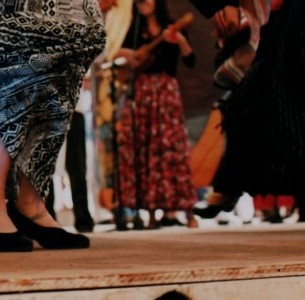
Almost 500 years ago in Veracruz, son jarocho was born in the fusion of African, indigenous and Spanish rhythms and melodies. These were also the times of the great Gaspar Yanga, a warrior and founder of an independent enclave for escaped slaves, whom legends say was a member of the Royal Family of Gabon, Africa.
A few centuries later, in 1776, son jarocho music was denounced to the Inquisition by a concerned Friar, for being the “preferred music of mulatas and people of mixed race”, danced with unvirtuous pelvic movements.
Most of us have heard at least one son jarocho tune, perhaps without even knowing it: “La Bamba”, a song whose title gives testimony to Mexico’s African “Third root”. It is also a song that has marked protest and change in the Americas throughout the ages.
In celebration of Latino African heritage, here’s a few of my favorite versions of La Bamba:
Richie Valens: The first Latinx musical trailblazer
In 1958, Ricardo Valenzuela transformed “La Bamba’s” folk beats into rock and roll grooves, becoming the first Latinx to successful cross over into North American rock and pop music. Valens created the first ever pop chart hit sung entirely in Spanish, influenced several generations of Chicano musicians and was inducted into the Rock and Roll Hall of Fame in 2001. His version of “La Bamba” also is no. 354 in Rolling Stone’s Greatest Songs of All Time and is the only one of the 500 songs listed which is in Spanish.
Los Lobos: Chicano Rock and Roll Pioneers
In 1987, Los Lobos version of “La Bamba” (created for Ritchie Valens’ biopic) became Number One (for 3 weeks) on Billboard’s Top 100, spending a total of seven weeks on the Top 10 and becoming a massive pop-rock hit worldwide.
Playing for Change: “La Bamba” around the World
Playing For Change was born in 2002 to inspire and connect the world through music based on the idea that this art “has the power to break down boundaries and overcome distances between people.” In 2014, Playing For Change documented a musical trip from the roots of Mexico into the heart of Africa, with a “La Bamba” that features amongst others, David Hidalgo and Cesar Rosas of Los Lobos, and La Marisoul from La Santa Cecilia.
Las Cafeteras: “La Bamba” as an Immigrant Anthem
“La Bamba Rebelde”, a version by the Californian Las Cafeteras, takes advantage of the verse improvisation that is a hallmark of of the original, converting it into an immigrant anthem that protests borders with a resounding, “¡Yo no creo en fronteras, yo cruzaré, yo cruzaré, yo cruzare!”.
“La Bamba” in 2016 : Protests at University of Veracruz
Almost 500 años after it was born, “La Bamba” is still capable of inspiring rebellion. On Friday, February 26, thousands of students organized protests in Xalapa, Veracruz at the Palacio de Gobierno. The students, improvising verses for the classic song of their state, protested the government’s budget and demanded more resources for the University of Veracruz.
Posted by En defensa de la Universidad Veracruzana.
—
Feature photo: Boessir Nehe
Check Catalina Maria Johnson’s weekly show and podcast Beat Latino, where you can also find examples of great AfroLatin@ and AfroLatinx music on this year’s and past Black History celebration specials.
